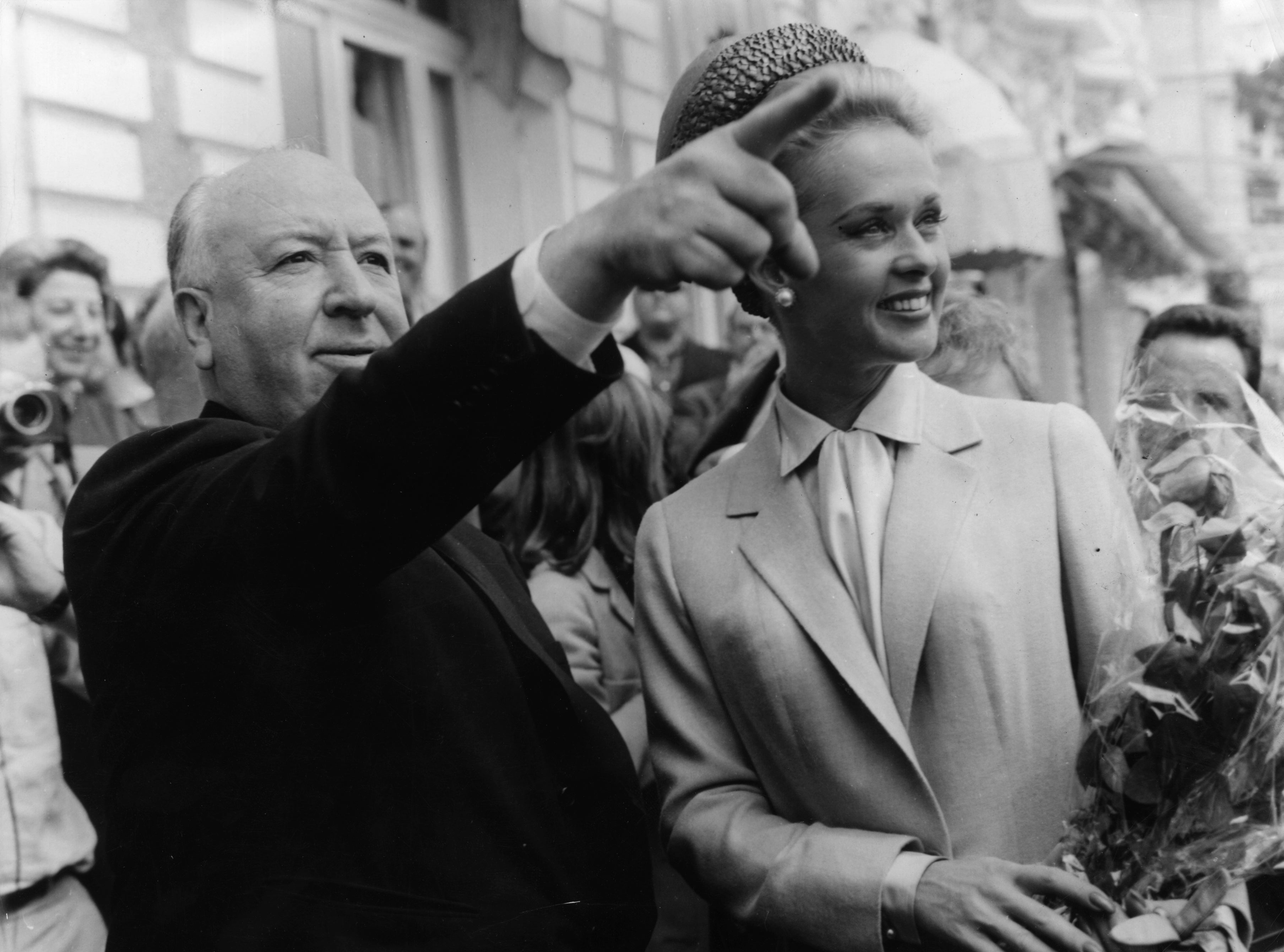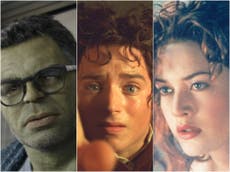The predatory obsession behind Alfred Hitchcock’s Marnie
The dark 1964 psychodrama was blighted by a feud between Hitchcock and its star, Tippi Hedren, fuelled by the director’s sexual obsession with her. Hedren’s performance nonetheless made ‘Marnie’ a great and fascinating film, writes Geoffrey Macnab – one that reveals dark truths about its creator

During her stand-off with Alfred Hitchcock on the set of Marnie (1964), Tippi Hedren hit the director where it hurt him the most – right in the midriff. “She [Hedren] did what no one is permitted to do. She referred to my weight,” the English filmmaker, still smarting about her insults many years later, complained to biographer John Russell Taylor. From that moment on, neither would speak directly to the other. He began referring to her as “the girl”.
Another biographer gave a very different account of why relations broke down so badly between the director and his 34-year-old star. Hitchcock had become hopelessly and pathetically obsessed with her. She was under contract to him, and he was trying to control every aspect of her life both on and off screen.
There was a three-decade age gap between them. He was deeply repressed, but that didn’t stop him from disgracing himself. “Hitchcock finally lost any remnant of dignity and discretion. Alone with Hedren in her trailer after the day’s work, he made an overt sexual proposition that she could neither ignore nor answer casually, as she could his previous gestures,” Donald Spoto claimed in his book The Dark Side of Genius: The Life of Alfred Hitchcock.
Whatever its cause, the breakdown of the relationship between Hedren and Hitchcock overshadowed Marnie even before the film was released. Loosely based on a novel by Poldark writer Winston Graham, this is the story of a disturbed young woman who steals from her employers and continually changes identity. One of her bosses, the upper-class American businessman Mark Rutland (played by Sean Connery in the first flush of his 007 celebrity), falls in love with her.
The film is sad and disquieting, both reflective of its director’s morbid obsessions and far more honest about sexual neurosis than many of his earlier, more openly escapist movies. Its protagonists are damaged figures. Marnie herself is a kleptomaniac, revolted by men (“I just never wanted anybody to touch me!”). Connery’s character, meanwhile, has a pathological fix on her precisely because she is a thief. He forces her into marriage, rapes her on their cruise ship honeymoon, and yet still portrays himself as her saviour.
Critics were understandably uncomfortable about the film’s seamy subject matter. They also complained about its “technical roughness” (all that crude back projection for the riding and driving scenes), and the “amateurish script”.
In the 60 years since Marnie premiered, its themes and the psychodrama playing out off camera have become intertwined in the public’s mind. Both are now regarded as prime evidence against Hitchcock. In Julian Jarrold’s TV-movie The Girl (2012), starring Sienna Miller as Hedren and Toby Jones as Hitch, the revered English auteur is portrayed openly as a dangerous sex ogre. In 2021, the star’s granddaughter Dakota Johnson accused Hitchcock of “terrorising” Hedren because she wouldn’t sleep with him, and of “ruining” her career.
Even so, in Marnie, Hedren gives an exceptional performance in an almost impossible role. She was playing a character being preyed on by a man who claims to have her best interests at heart. Of course, by her own account, she was in exactly that predicament herself.
Hitchcock delves into very dark territory. That, in itself, wasn’t a surprise. From the stabbing in Blackmail to Norman Bates’s unhealthy mother fixation in Psycho, the director had been exploring the murderous and macabre throughout his career – and cranking up the suspense as he did so. The difference here was that Marnie was a psychological drama, not a crime thriller.
In its more lurid and gothic moments, the movie resembles one of Angela Carter’s adult fairytales. Whenever the heroine sees the colour red or hears lightning, she is thrown into a blind, feral panic. “If you want to reduce Marnie to its lowest common denominator, it is the story of the prince and the beggar girl,” Hitchcock told his fellow director François Truffaut.

The occasional attempts at humour (Connery poring over books with titles such as “Sexual Aberrations of the Criminal Female”, or Hedren joking about a failed suicide attempt) seem tasteless and incongruous. The film, though, still boasts some memorably disorienting scenes. The opening, showing Hedren, her usually blonde hair dyed jet black, walking along a completely empty railway platform with a yellow bag under her arm, has a warped, dream-like atmosphere similar to that found in Maya Deren’s 1943 avant-garde classic Meshes of the Afternoon.
To be the object of someone’s obsession is horrible
I interviewed Hedren in 2012, when she came to Britain to introduce an evening of clips and music from Hitchcock’s films at a venue in Croydon. It was striking then how ambivalently she still spoke about her old tormentor. She both excoriated him and praised him.
“To be the object of someone’s obsession is horrible,” she told me. “Any woman who has had that kind of situation will certainly agree with me. I demanded to get out of the contract, but when I did that he said: ‘Well, you can’t. You’ve got your daughter to raise and your parents are getting older.’ I said: ‘No, I want to get out. The people who love me do not want me in this situation.’”
You’d think Hedren would want Hitchcock “cancelled” (to use contemporary parlance). Instead, she was coming to Fairfield Halls for an evening in his honour. He was, as she wrote in her autobiography a few years later, “a man I look back on with admiration, gratitude and utmost disgust”.
It wasn’t as if the former model embarked on Marnie from a position of ignorance. When she made The Birds (1963), her first film with him, a year before, she had already begun to experience the more sinister side of his behaviour. “It was almost like stalking,” she later said of how he would stare at her all the time. He notoriously forced her to shoot take after take of the scenes where she was pecked at by live birds.

Nonetheless, after Grace Kelly turned the role down, Hedren agreed to play Marnie. She was under contract to the filmmaker so had limited scope to reject the role but still admitted she was “excited” to take it.
One of Hitchcock’s most infamous quotes was that “all actors should be treated like cattle”. In Hedren’s case, he tried to control what she wore, and what she ate, and (as Spoto points out) even insisted that the name Tippi should appear in single quotation marks (she had been baptised Nathalie).
Hedren appreciated that her very own Professor Henry Higgins was providing an instant education in cinema that would otherwise have taken many years to acquire. Nonetheless, her performance in Marnie was still her own. It’s absurd to suggest that the English director was somehow able to create her character’s mix of rage, terror, trauma, inhibition and furtive cunning simply through clever editing and camerawork. She had thrown herself into her role, spending long hours with psychologists who could give her insights into the character’s neuroses and vulnerabilities.
She refused to play Marnie as a victim. Only during her breakdown, when she relives her experiences as a five-year-old girl, does the character become an object of pity.
Connery is also surprisingly sympathetic in a role that calls for him to behave with brutality towards Marnie one moment and with the utmost sensitivity the next. In the early scenes, he has the same sadistic swagger he displays in his first Bond pictures – but when she finds his charm and machismo all too easy to resist, he begins to look very lost.

Marnie absolutely defies attempts to dismiss it as an exercise in misogynistic self-gratification on behalf of its director. It’s a messy, uncomfortable and uneven affair – and that is its fascination. “It is a very flawed movie, for which I have to take a lot of the responsibility,” screenwriter Jay Presson Allen later acknowledged. The flaws, though, are precisely what make it so unsettling.
There is no glib resolution here, no criminal to be killed or villain apprehended; no clever final-reel plot twist, or melodramatic climax with the heroine falling off a bell tower. Instead, the film ends simply with an acknowledgement of long-buried childhood trauma.
The heart-wrenching monologue by Marnie’s mother (impeccably delivered by Louise Latham), when she finally acknowledges what happened when Marnie was five years old, is one of the rawest, most moving moments you’ll find in any Hitchcock movie.
Marnie remains (as John Russell Taylor called it) “probably the most controversial of Hitch’s works” – a movie that, for some, will always be tainted, and that for many others marks the beginning of the director’s decline. It remains far less feted than Psycho, Vertigo, The Birds or North By Northwest. Little fanfare was made about the film’s 60th anniversary. The director himself seemed to lose interest in it after his falling out with Hedren.
Seen today, though, Marnie emerges as one of Hitchcock’s richest, strangest and most revealing films. Anyone interested in understanding just what made him tick would be well advised to start here.
‘Marnie’, celebrating its 60th anniversary this year, is available on Prime Video






Join our commenting forum
Join thought-provoking conversations, follow other Independent readers and see their replies
Comments